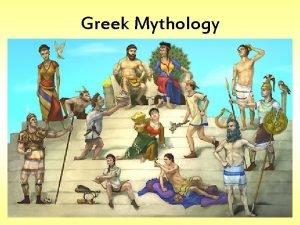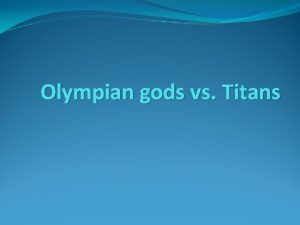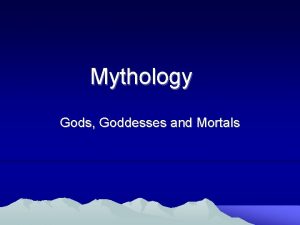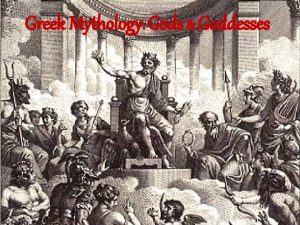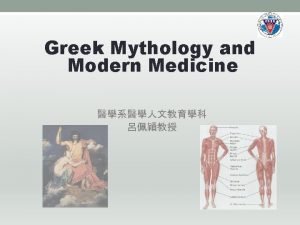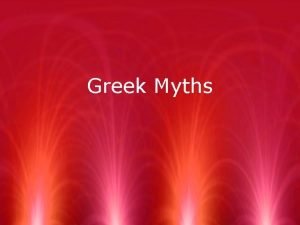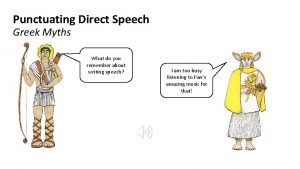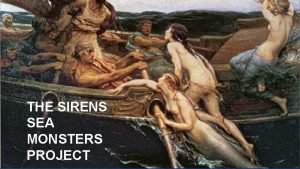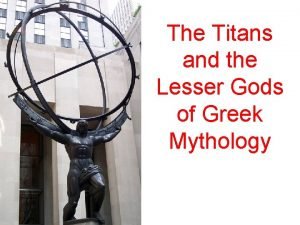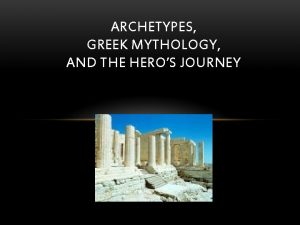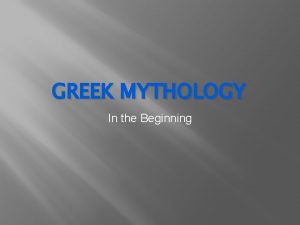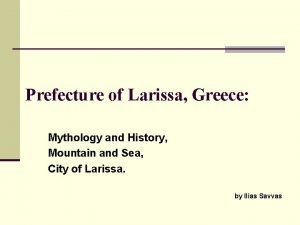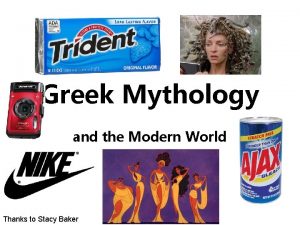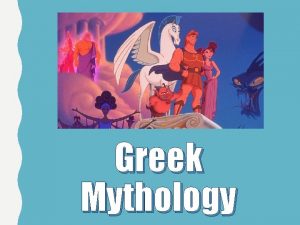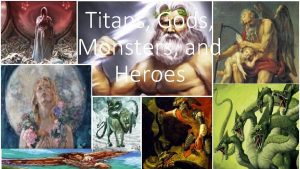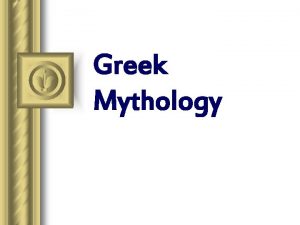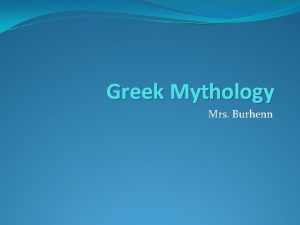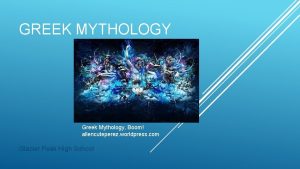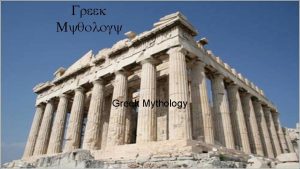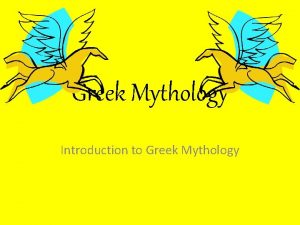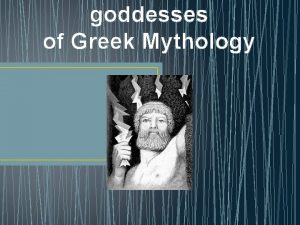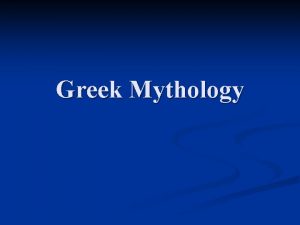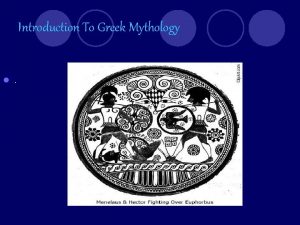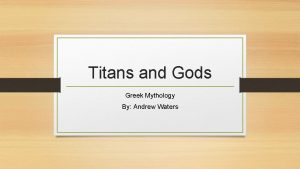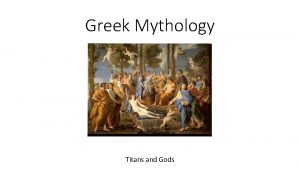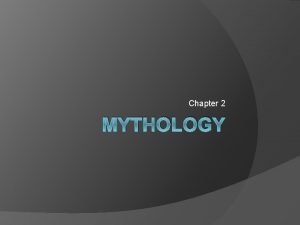Greek Mythology The Titans were a race of
























- Slides: 24

Greek Mythology

The Titans were a race of gods who were the parents and precursors of the Olympians. They were defeated by the younger generation of deities (the Olympians), who were led by Zeus. The ancient Greek poet Hesiod, in his Theogony, claims that the goddess Gaia (Earth) first gave birth to Uranus(Heaven), then mated with him to produce the Titans.

The Olympians are a group of 12 gods who ruled after the overthrow of the Titans. All the Olympians are related in some way. They are named after their dwelling place, Mount Olympus. The Olympian Gods are: Zeus, Poseidon, Hades, Hestia, Hera, Ares, Athena, Apollo, Aphrodite, Hermes, Artemis, Hephaestus. Click the heart for a gallery of images of gods and goddesses.

Mythology Vocabulary Oracle – a female priest who gave people prophesies Ambrosia – Ambrosia was the food of the gods and goddesses in Greek mythology. Nectar – The drink of the gods guaranteed to satisfy any immortal’s thirst. Nymph - They were revered as the spirits of specific natural features - mountains, rivers, trees, and even groves were usually associated with a type of nymph. The name "nymph" comes from the Greek word that means "young woman", and so naturally these beings were considered to be female. Indeed, they were represented as lovely and eternally youthful creatures.

More Vocabulary Hubris - excessive pride or arrogance Cerberus - Cerberus was the guardian of the Greek Underworld, and a faithful servant of Hades. He was represented as a grotesque dog who had three heads all of which snarled at those foolish enough to attempt to leave the Underworld; the dog also had the tail of a serpent. Labyrinth - a maze created by Daedalus (for King Minos of Crete) to contain the Minotaur

More Vocabulary Charon - He transported the dead to the Underworld in his ferry River Styx - This river flows to the Underworld Icarus – son of Daedalus who flew too close to the sun and drowned in the sea Daedalus – Father of Icarus who created the wings and was thus considered the “Father of Flight” Minotaur - The Minotaur was a deadly and terrifying monster. The Minotaur played a small but significant part in myth, and is most memorable in his role as the half human, half bovine inhabitant of the mysterious labyrinth. In addition, he was also the enemy of the Greek hero Theseus.

Cronus (Roman Name – Saturn) Cronus, the son of Uranus and Gaia and the youngest of the twelve Titans. His wife was also one of the Titans, since he married his sister Rhea. Their offspring were Demeter, Hestia, Hera, Hades, Poseidon, and Zeus.

Zeus (Roman Name: Jupiter) Zeus, the youngest son of Cronus and Rhea, he was the supreme ruler of Mount Olympus and of the Pantheon of gods who resided there. Being the supreme ruler he upheld law, justice and morals, and this made him the spiritual leader of both gods and men. Zeus was a celestial god, and originally worshiped as a weather god by the Greek tribes.

Hera (Roman Name: Juno) The queen of the Olympian deities. She is a daughter of Cronus and Rhea, and wife and sister of Zeus. Hera was mainly worshipped as a goddess of marriage and birth. It is said that each year Hera's virginity returns by bathing in the well Canathus. According to some sources, however, her children were conceived without the help of a man, either by slapping her hand on the ground or by eating lettuce.

Poseidon (Roman Name: Neptune) Poseidon was the Greek god of the sea and earthquakes. Poseidon was depicted as a bearded man with long hair, holding a trident and accompanied by dolphins and fish. He had the reputation for having a very bad temper. The symbol of Poseidon's power was the three Poseidon was the brother of pronged spear known as Zeus and Hades. the trident.

Athena (Roman Name: Minerva) Athena, goddess of wisdom, was the favorite child of Zeus. She had sprung fully grown out of her father's head. She was the divine sponsor of warriors and heroes, she introduced several of the arts and crafts necessary for civilization, and she represented wisdom. Obviously, the goddess played a prominent role in Greek mythology.

Apollo (Roman Name: Apollo) Apollo is in many respects the paradigm of a Greek god. He represents order, harmony, and civilization in a way that most other Olympian deities cannot quite equal.

Artemis (Roman Name: Diana) The goddess Artemis played an intriguing role in Greek mythology and religion. She was known as the "Mistress of Animals" and the protectress of children, but she was also a huntress and the goddess who could bring death with her arrows.

Hades (Roman Name: Pluto) Hades is the brother of Zeus. After the overthow of their Father Cronus he drew lots with Zeus and Poseidon, another brother, for shares of the world. He had the worst draw and was made lord of the underworld, ruling over the dead. He is a greedy god who is greatly concerned with increasing his subjects.

Ares – (Roman Name: Mars) Ares was the Greek god of war, and according to mythology, war, battles, and bloodshed were his major preoccupations. However, there is one other area in which Ares was interested, and that is indeed pleasure - with the goddess Aphrodite.

Aphrodite (Roman Name: Venus) As the Greek goddess of love and beauty, Aphrodite holds great power over both mortals and immortals. Therefore, it should come as no surprise that she is featured in numerous myths, poems, and plays; likewise, there are many representations of Aphrodite in Greek sculpture and vase painting. The Birth of Aphrodite - Bouguereau

Demeter (Roman Name: Ceres) As the goddess of grain and fertility, Demeter played an important indeed essential - role in ancient Greek society. Likewise, her association with grain also translated into a close relationship with human fertility, as this was another crucial part in our continuing survival. By Lord Leighton

Hermes (Roman Name: Mercury) Hermes was the son of Zeus and Maia. He presided over commerce, wrestling, and other gymnastic exercises, even over thieving, and everything, in short, which required skill and dexterity. He was the messenger of Zeus, and wore a winged cap and winged shoes. He bore in his hand a rod entwined with two serpents, called the caduceus.

Hephaestus (Roman Name: Vulcan) Hephaestus is the son of Zeus and Hera. Sometimes it is said that Hera alone produced him. He is the only god to be physically ugly. He is also lame. Some say that Hera, upset by having an ugly child, flung him from Mount Olympus into the sea, breaking his legs. He is the god of fire and the forge. He is the smith and armorer of the gods. He uses a volcano as his forge. He is the patron god of both smiths and weavers. He is kind and peace loving.

Hestia (Roman Name: Vesta) In Greek mythology, Hestia was the goddess of home and hearth, and she represented the ideal of purity in these areas. Possibly for this reason Hestia was an eternal virgin, deliberately remaining aloof from the advances of the male gods.

Dionysus (Roman Name: Bacchus) Dionysos is an atypical Greek deity. While the Olympian gods are bright beings of sunlight, Dionysos is a creature of mystery, his very essence an enigma. His realm is shadowy, and his followers flirt with madness, drunkenness, and death.

Pan (Roman Name: Faunus) Pan, the god of woods and fields, of flocks and shepherds, dwelt in grottos, wandered on the mountains and in valleys, and amused himself with the chase or in leading the dances of the nymphs. Pan, like other gods who dwelt in forests, was dreaded by those whose occupations caused them to pass through the woods by night, for the gloom and loneliness of such scenes dispose the mind to superstitious fears. Hence sudden fright without any visible cause was ascribed to Pan, and called a Panic terror.

Eros (Roman Name: Cupid) Eros was the god of love in Greek mythology. Indeed, Eros was the darling of poets and artists over the centuries. He also inspired desire in countless Greek gods, goddesses, heroes, and heroines. Eros, over the centuries, is transformed in myth and art from a handsome young man to a chubby mischievous child.

Janus was the god of gates in Roman mythology. And in his role as the numen of gates and doors, Janus was also thought to represent beginnings. As the god of beginnings, Janus also lent his name to the first month of the year.
 Who were the titans
Who were the titans Hécatonchires
Hécatonchires Gods vs titans
Gods vs titans What is the greek miracle in greek mythology
What is the greek miracle in greek mythology Design of dams
Design of dams Data race vs race condition
Data race vs race condition Difference of impulse and reaction turbine
Difference of impulse and reaction turbine Greek mythology chart
Greek mythology chart Odyssey history channel
Odyssey history channel Modern greek medicine
Modern greek medicine Half woman half snake greek mythology
Half woman half snake greek mythology Greek mythology speech
Greek mythology speech Eight brief tales of lovers
Eight brief tales of lovers Greek monster family tree
Greek monster family tree Kei islands indonesia mermaid
Kei islands indonesia mermaid Sighkee
Sighkee Hundred handed giants greek mythology
Hundred handed giants greek mythology Greek mythology archetypes
Greek mythology archetypes Evius
Evius Gyges greek mythology
Gyges greek mythology Epocrates greek mythology
Epocrates greek mythology Larissa mythology
Larissa mythology Mythology in the modern world
Mythology in the modern world Hundred handed giants greek mythology
Hundred handed giants greek mythology Ancient greece webquest
Ancient greece webquest
